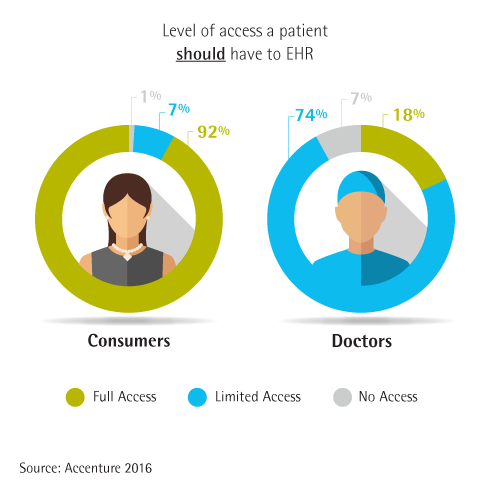 Patients are from Mars and Doctors from Venus when it comes to their views on whether consumers should have full access to their electronic health records (EHRs), according to a survey from Accenture released this week at the 2016 meeting of the HIMSS conference in Las Vegas.
Patients are from Mars and Doctors from Venus when it comes to their views on whether consumers should have full access to their electronic health records (EHRs), according to a survey from Accenture released this week at the 2016 meeting of the HIMSS conference in Las Vegas.
The vast majority of consumers are keen to access their full EHR, compared to a majority of doctors who advocate for limited access, as the circle diagram dramatically illustrates.
The “old days” of patient information asymmetry — with a paper-based folder that got locked up in a health records cabinet — are gone. There’s now greater “information symmetry,” Dr. Kaveh Safavi, Accenture’s health practice leader, said during our meeting to review the survey results.
Patients want to see what the doctor sees — the full EHR and notes, Accenture’s press release states. The most important information topics consumers seek in their EHRs are access to lab results and the physician’s notes about the visit. Based on Accenture’s findings, it appears that most patients are not looking into their EHR data to make decisions but instead to simply stay up-to-date on the physician’s perspectives on their health, Dr. Safavi explained.
Note that the interest in EHR data access skews older, to the demographic of 65 and over. Wearables and health apps skew younger. Thus the stereotype of older folks not wanting technology doesn’t hold: older people just use and prefer different technology.
What’s underneath this yin-and-yang of EHR access demand?
The market forces are converging to make EHR access an inevitable outcome, Dr. Safavi asserted. He identified several factors leading to that end-game of patients eventually getting full access to their EHRs: consumers’ expectations for digital health and convenience (the likes of which people find in other aspects of daily life); peoples’ growing willingness to switch doctors who do not provide digital health access; and, the policy perspective that the health record data indeed belongs to patients.
This “standoff” between doctors and patients when it comes to full EHR access may be “more a reflection of a grieving process among doctors than anything else,” Dr. Safavi hypothesized. Opening up the EHR and notes-kimono can bring “a sense of transparency which brings accountability that not everybody wants,” he said.
“Consumers want the information,” Dr. Safavi summarized. “They don’t want to be the doctor.”
For this study, Accenture sponsored the survey of 8,000 consumers in seven countries, including 2,225 respondents from the U.S., between November 2015 and January 2016. The company had also conducted a survey among physicians addressing the doctor-EHR access data.
Health Populi’s Hot Points: The results of the research on Open Notes was clear: instead of bringing on havoc, as patients get access to the full complement of physician notes in their EHRs, the quality and accuracy of those notes, and patient activation, improves. Greater transparency builds trust between the physician and the patient.
And that patient is increasingly operating in a retail health context, paying more out-of-pocket in the form of higher premiums up-front, deductibles during the patient journey, and post-encounter EOBs that can still look like arcane math spreadsheets indecipherable to the man or woman on the street.
“Once physicians recognize they want to compete in the retail market, they will want to err on side of building these things,” that is, enchantingly designed patient portals and consumer on-ramps to personal health information. “The parts of health care delivery systems that don’t believe this will happen will have to follow,” Dr. Safavi forecasted.





 Thanks to Feedspot for naming this blog, Health Populi, as a
Thanks to Feedspot for naming this blog, Health Populi, as a